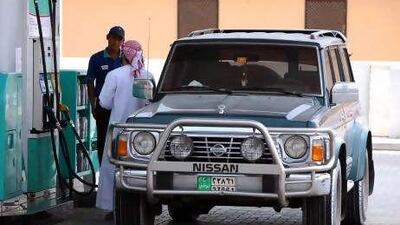Car dealers and economists believe plans by the Federal Government to raise petrol prices will over time push UAE drivers out of gas-guzzling sport utility vehicles and sports cars and into smaller, more efficient vehicles. Today's increase of 20 fils a litre on all grades of petrol will hit specific types of buyers, said Michael Ayat, the chief executive of Arabian Automobiles, which markets Nissans and Infinitis.
"This will not reduce the number of vehicles which are sold, but the customers will move their choices, maybe to smaller cars or more economical cars," including "downsizing from eight-cylinder to six-cylinder", he said. Long-range commuters travelling alone would be most affected, he said. "For a guy who is commuting between Dubai and Abu Dhabi, that is the customer who has to take this into consideration."
The Government on Monday indicated it was working towards a "liberalisation of prices" that would push up the cost at the pump by many times today's increase, which comes just three months after a rise of 15 fils a litre. The two increases - which total as much as 27 per cent, depending on the grade of petrol - are the first time the Government has relaxed price caps since 2005. As of today, a litre of special-grade petrol costs Dh1.72, compared with an average US price per litre of Dh2.65 (72 US cents), which represents the market price plus an average of 44 fils in taxes.
The UAE's subsidised prices have encouraged consumers to buy big, powerful cars and trucks with poor fuel-efficiency. A major shift away from such vehicles "is not going to happen overnight", said Mahmoud Samara, the regional manager for General Motors in the UAE, Qatar and Oman. "V8, or what they like to call gas-guzzlers, are still very popular here," he said. "Some [consumers] will start going from SUVs to cross-overs and smaller engines, but is it going to be a big proportion? We don't think [so]."
But the recent history of the US car market, where four-wheel-drive vehicles were a dominant type only three years ago, shows that higher fuel prices can have a dramatic effect on the market share of different car models. A study last year sponsored by the national bureau of economic research (NBER), a non-profit group that provides data to the US government, found that for every $1 increase in the price per US gallon of petrol between 2001 and 2008, big 4x4s, minivans and pickups lost 17.7 per cent of their market share. At the same time, the most efficient vehicles gained 17.5 per cent.
The study, which took into account a number of factors including income and geographic location, also found that for every $1 increase in the price of petrol, the price of the least-efficient used cars dropped an average of $1,072. Lower-income consumers are generally more responsive to small price changes, but those with higher incomes are the ones buying new cars, said Meghan Busse, a professor at the Kellogg School of Management at Northwestern University in Illinois and a co-author of the NBER study.
"It could also be that low-income drivers are already in relatively economical, fuel-efficient cars, and so it is high-income drivers who are moving out of big SUVs in response to gasoline prices," Prof Busse wrote yesterday in an e-mail. Today's price increase will encourage consumers "to prick up their ears and start to look at what is the comparable fuel-efficiencies", said Len Hunt, the group director of Al-Futtaim Group's automotive division, which sells Toyotas and Lexuses.
@Email:aligaya@thenational.ae @Email:cstanton@thenational.ae

